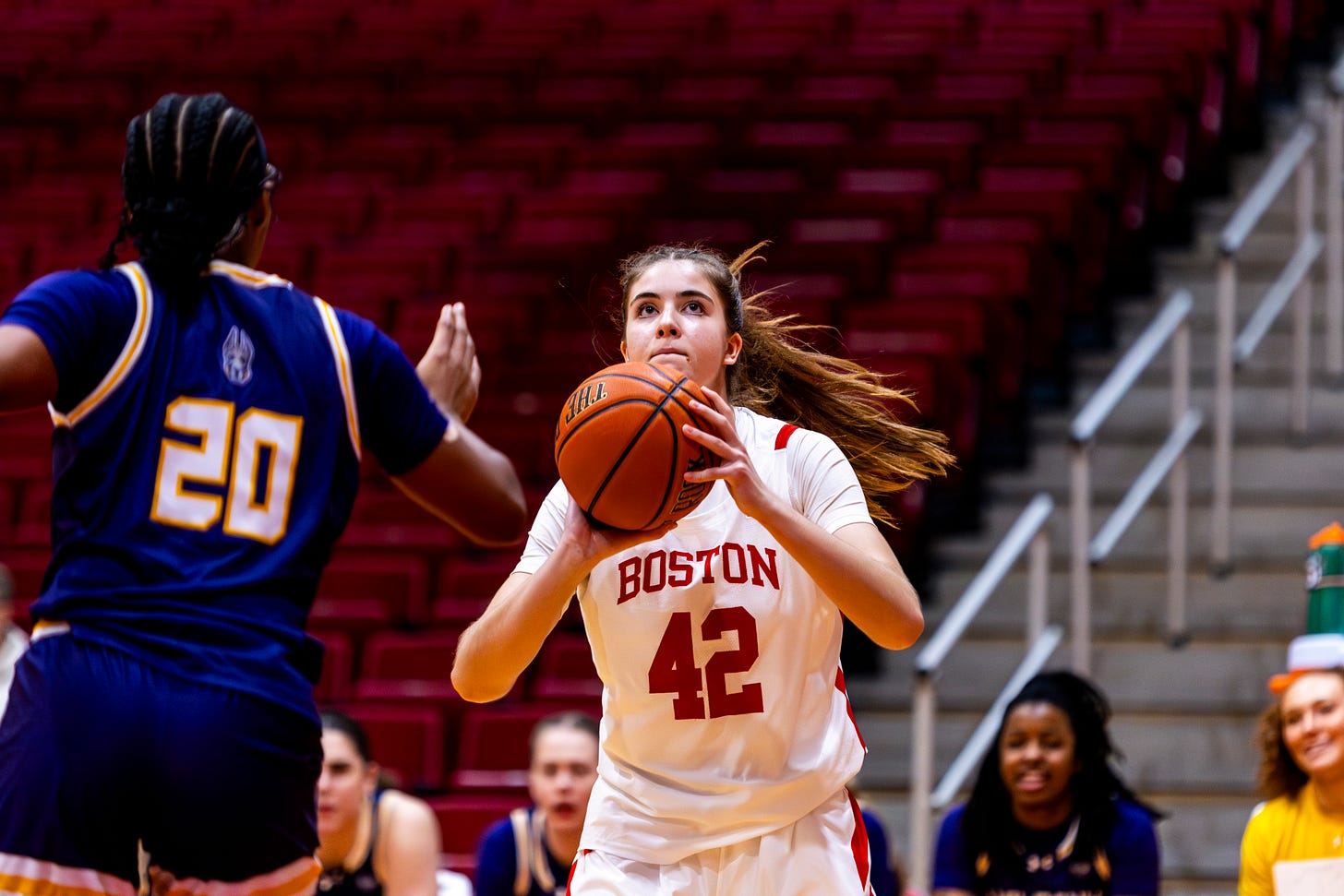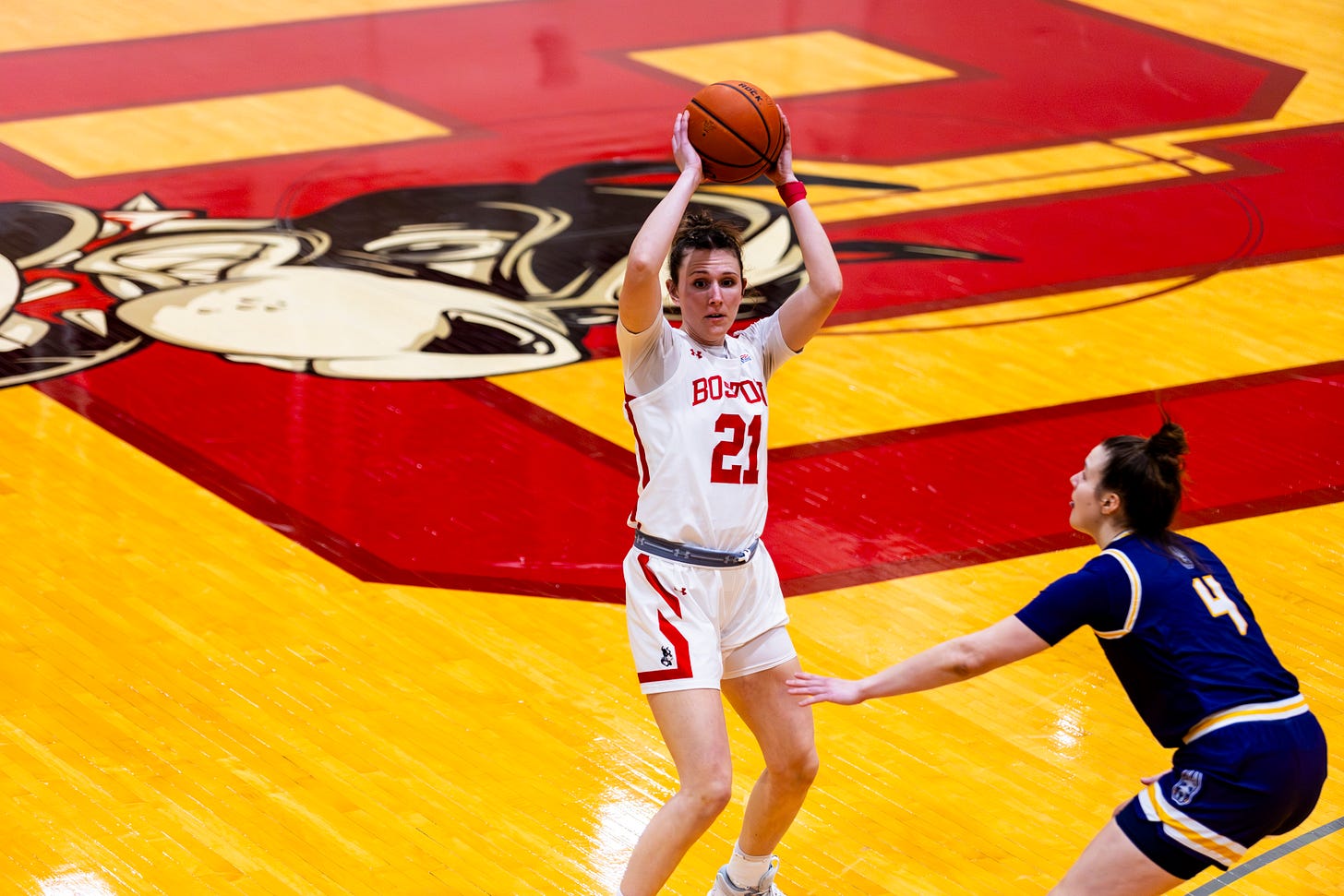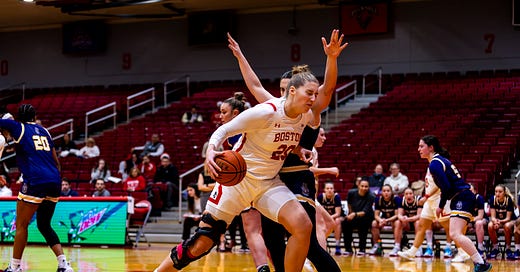In blowout loss to UAlbany, the BU women’s basketball team’s two big problems were costly — again
The Terriers had 20 turnovers and allowed UAlbany to corral 16 offensive rebounds in a 36-point loss.
BOSTON — Melissa Graves raised a hand to her forehead and paused as she pondered one of the two problems that just won’t go away for her Boston University women’s basketball team.
“You know, we had three assists today to 20 turnovers,” she said, scratching her head.
“Which is just…” she paused again. “It’s a crazy ratio.”
She’s starting to sound like a broken record in the Eilberg Lounge above Case Gym, as she continues to answer questions from reporters about the part of that ratio (hint: it’s the turnovers) plaguing BU in nearly every game it plays. There was a hope, which Graves acknowledged, that the Terriers were improving in the category after they accomplished their game-by-game goal of committing less than 13 turnovers for the first time in a win over Le Moyne last Thursday.
“I feel like we’ve gotten a little bit better taking care of the basketball,” Graves said.
And maybe BU has, but Tuesday’s blowout, 72-36 home loss to UAlbany was a disheartening step in the wrong direction. The Terriers’ 20 turnovers were the second-most they’ve committed in a game this season (only topped by a road loss to No. 2 UConn back on Nov. 7), and the Great Danes scored a whopping 30 points from those giveaways. BU is now averaging 18.6 turnovers per game, the second-highest among teams in the Patriot League.
When she was asked about it postgame, Graves listed out everything her program is doing to turn the tide around, with the tone of someone who is running out of answers.
“We focus on it in practice, every drill has a turnover limit. In practice, we have a total turnover limit. We watch them. We talk about reads. We do read drills constantly,” she said.
BU (4-4) is an exceedingly young team — with only one fully healthy upperclassman (senior guard Alex Giannaros, who scored a team-leading 14 points Tuesday) in the rotation. Inexperienced in general, the Terriers also lack experience with each other — there are seven new players on the roster this year (after eight joined last season). There’s no sweet-talking 18.6 turnovers a night, but with that level of roster change, it would be impressive if turnovers weren’t some kind of problem only eight games in.
What is much less excusable, however, is the second problem BU can’t seem to figure out.
That’s defensive rebounding, which reached a fever pitch on Tuesday. The Great Danes corralled 16 offensive boards (for 12 second-chance points) and outrebounded the Terriers by eight overall. BU is allowing its opponents over 12 offensive rebounds a game and has surrendered at least 11 in each of its last six games. Its average rebounding margin this season is negative six; like the turnovers, it’s second worst among teams in the Patriot League.

Defensive rebounding was an equally large problem last season (BU also allowed over 12 a game), and Graves was asked Tuesday why it’s been a consistent issue for her program, and if she’s considered changing her approach.
“It’s a great question,” Graves said. “I ask them all the time, and that’s also a focus. We have the offensive rebound limit in drills, we have an overall limit in practice. We do box-out drills every single day, and now we’ve also added offensive rebounding drills for us to work on. But it’s just a mentality, it’s a ‘heart’ piece, and I’ve told them that.”
It is a mystifying trend, considering that perhaps the biggest strength for this young group has been, well, its mentality and its heart. These Terriers have competed like crazy all season and have consistently displayed mettle beyond their years; they’ve worked hard on defense, built confidence on offense and have dug themselves out of early holes consistently.
“Our young players bring a phenomenal energy that we haven’t had in the past,” Graves said after an exhibition win over Emmanuel on Nov. 12.
Yet as soon as it's time to collect a rebound, BU simply isn’t locked in.
Graves was asked Tuesday if she has any idea why rebounding — and only rebounding — has been so hard for her team to get up for.
“I do not,” she responded, assuming an exasperated tone. “I have asked them, we’ve watched it, they can’t give an answer on it. So we’re just going to continue to practice and break it down and hope that we have a breakthrough on it.”
Winning on Tuesday was always going to be a tall task against a team as good and experienced as UAlbany; the Great Danes (8-1) start four graduate students and received a vote in the latest Mid-Major Top 25.
“That’s a phenomenal team, it’s a veteran team, and they’re crazy efficient offensively,” Graves said, and it all proved to be true.
The Terriers held leading-scorer Kayla Cooper to 15 points (four below her season average coming in), only for third-leading scorer Kaci Donovan to erupt for 32. The Great Danes shot 47 percent on 62 total field goals and made eight 3-pointers. Graves, when asked how the approach to the game and the message after it was done compared to No. 2 UConn earlier in the season, said it “was very similar.”
Still, the Terriers did themselves no favors. And that’s precisely the problem with BU’s two biggest problems. Not only do BU’s turnovers cost it possessions, but its poor defensive rebounding hands extra possessions to the opponent. That’s how the Great Danes wound up attempting 14 more field goals than the Terriers and, ultimately, how a date with a tough mid-major opponent ballooned into a 36-point loss.
“I felt like we didn’t show up today, and we weren’t ready to go,” Graves said. “We just weren’t locked in.”

And the confronting reality is that, “phenomenal” opponent or not, committing 20 turnovers and allowing 16 offensive rebounds isn’t going to fly. It turned a loss into a blowout on Tuesday, but come Patriot League play — the games that actually matter — it could turn victory into defeat.
“I talked to the team after about how I’m just going to reflect on this, what I can do better,” Graves said. “But we’re all just reflecting so we can learn from this and actually take steps toward getting better.”
Graves often says the non-conference schedule is about just that — getting better. But through eight games, in its two most problematic areas? BU hasn’t.




